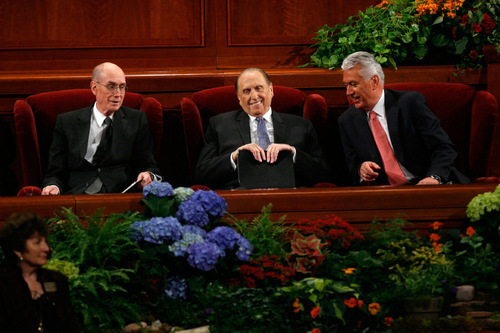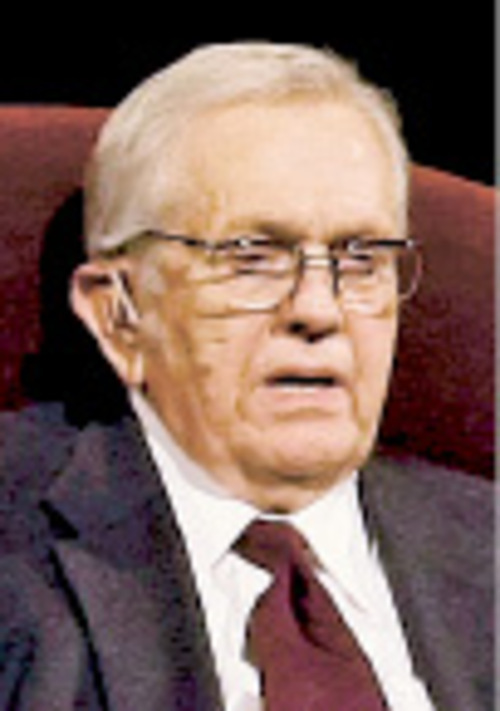This is an archived article that was published on sltrib.com in 2010, and information in the article may be outdated. It is provided only for personal research purposes and may not be reprinted.
Scores of Mormons felt confused and bruised this weekend by LDS apostle Boyd K. Packer's unequivocal condemnation of same-sex marriage and insistence that gays can change their attractions with enough faith.
It wasn't the substance of what Packer said on Sunday during the faith's 180th Semiannual General Conference. No one expected the senior member of the Quorum of the Twelve Apostles to revise the church's stance. The speech prompted thousands of online comments and dozens of blog entries.
What bothered many, they say, was the style of his presentation that left them feeling Packer's views were at odds with the more nuanced and compassionate recent statements by other Church of Jesus Christ of Latter-day Saints leaders.
Packer's words "are an anomaly in the parade of statements coming out of the [LDS] church," said Carol Lynn Pearson, a Mormon writer in northern California who has worked to make gays feel welcome in the Utah-based church.
She pointed to interviews and articles by LDS leaders such as apostles Dallin H. Oaks and Jeffrey R. Holland, as well as the church's own pamphlet on same-sex attraction called "God Loveth His Children."
The speech "hurt my heart," she said in a phone interview, "because I receive all the time e-mails from young gay Mormons who feel so diminished and defeated."
Pearson said Packer's approach seemed so different from the style of Elder Marlin Jensen, LDS Church historian and member of the First Quorum of Seventy, who, while on assignment last month, listened and wept with gay and lesbian members in the Bay Area.
Mormons in the LDS Oakland Stake were particularly divided by their church's drive to help pass Proposition 8. The affluent stake dutifully raised more than $100,000 for the effort to define marriage as exclusively between one man and one woman, but became emotionally and socially split over the issue.
Jensen was the visiting general authority and offered to meet with members on the issue. About 90 people attended the meeting by invitation, and 13 shared their stories of pain as gays or family members, Pearson reported on her website. After one particularly harrowing account, many in the room, including Jensen, began to cry.
The speaker said he felt the church owed him an apology.
Jensen arose and said through his tears, according to Pearson, he had heard very clearly the pain that had been expressed and that "to the full extent of my capacity I say that I am sorry."
Marriage as only between a man and a woman was a "bedrock of our doctrine and would not change," Jensen told the group that day, nor would the policy requiring gays to remain celibate.
"However, I want you to know that as a result of being with you this morning, my aversion to homophobia has grown," Jensen said. "I know that many very good people have been deeply hurt."
Jensen's heartfelt empathy was such a healing balm that day, said Andy Sorenson, bishop of the Moraga Ward, home to about half the participants. There was widespread sobbing.
"He said that we have to do better going forward as a Christian people in expressing Christ's love and fostering our common bonds together," Sorenson said Monday. "It was one of the most powerful spiritual experiences of my life."
Some Mormons ministering to gays wonder what the fuss is about Packer's speech.
It was "nothing new," said David Pruden, the president of Evergreen International, a nonprofit group that helps Mormons "overcome gay behavior and diminish same-sex attraction," according to its website. "This is what the [LDS] leaders have been saying for decades."
Pruden dismissed the idea that Packer's comments about gays overcoming their attractions would lead to more suicides.
"How many Latter-day Saints feel despair when the world tells them they can't change or even successfully manage their attractions?" Pruden said. The LDS Church — and Packer — are simply saying to the members, "Live the standards of the church."
LDS spokesman Scott Trotter emphasized Monday that the apostle's speech was consistent with the church's longtime position.
"The [LDS] Church's doctrine on the importance of marriage and family and its implications for same-gender marriage are very clear," Trotter said in a statement, "and are based on principles of truth, respect and love for all of God's children."
Moreover, he said, "We have continually emphasized that there is no room in this discussion for hatred or mistreatment of anyone."
Kristine Haglund, editor of the Boston-based magazine, Dialogue — A Journal of Mormon Thought, cautions people not to make too much of the speech.
The talk is best understood, Haglund said in an e-mail, "as a last volley in what President Packer sees as the last great battle of his life."
The longtime Mormon leader's refusal "to soften or moderate his stance, even as the rest of the [LDS] Church has slowly evolved away from the view that homosexuality is merely an evil choice," she wrote, "is evidence of his personal tenacity and zeal, but not necessarily indicative that doctrine and practice aren't shifting."
The speech's greatest harm, Haglund said, is "the pain and grief it potentially inflicts on gay people and their friends and families."
For members like editor and writer Jana Riess of Cincinnati, "It is painful to be so at odds with my church on this issue."
In her column Flunking Sainthood at beliefnet.com, Riess asks: "If the goal is to become like Jesus, why, then, do we fixate so much of our attention on condemning homosexuality, a subject that Christ did not address a single time in his earthly ministry?"
Online The speeches
The recent LDS General Conference addresses, including Boyd Packer's condemnation of same-sex attraction, can be viewed at lds.org. Additional material can be found at newsroom.lds.org.





